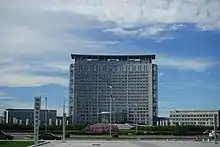Daqing Oil Field
The Daqing Oil Field (simplified Chinese: 大庆油田; traditional Chinese: 大慶油田; pinyin: Dàqìng Yóutián), formerly romanized as "Taching",[1][2] is the largest oil field in the People's Republic of China, located between the Songhua river and Nen River in Heilongjiang province. When the Chinese government began to use pinyin for romanization, the field's name became known as Daqing.
| Daqing Oil Field | |
|---|---|
 Main Building of Daqing Oil Field Co. Ltd. | |
 | |
| Country | China |
| Region | Heilongjiang province |
| Offshore/onshore | Onshore |
| Coordinates | 46.60°N 124.90°E |
| Operator | Daqing Oilfield Company Limited |
| Field history | |
| Discovery | 1959 |
| Start of production | 1960 |
| Peak year | 2008 |
| Production | |
| Current production of oil | 600,000 barrels per day (~3.0×107 t/a) |
| Year of current production of oil | 2021 |
| Peak of production (oil) | 800,000 barrels per day (~4.0×107 t/a) |
| Estimated oil in place | 16,000 million barrels (~2.2×109 t) |
| Recoverable oil | 3,600 million barrels (~4.9×108 t) |
History
Discovered in 1959 by Li Siguang, Wang Jinxi (who led No. 1205 drilling team) worked on this oilfield. This field has produced over 10 billion barrels (1.6×109 m3) of oil since production started in 1960. Daqing contained 16 billion barrels (2.5×109 m3) or 2.2 billion tons in the beginning; the remaining recoverable reserves are about 3.6 billion barrels (570×106 m3) or 500 million tons.
During its 1960 construction during the Great Leap Forward, Oil Minister Yu Qiuli mobilized workers building the Daqing oil field through ideological motivation instead of material incentives, focusing enthusiasm, energy, and resources to complete a rapid industrialization project.[3]: 52–53 The successful construction of the Daqing oil field despite harsh weather conditions and supply limitations became a model held up by the Communist Party as an example during subsequent industrialization campaigns.[3]: 52–54 On February 5, 1964, the central Party promoted Daqing oil field to other industrial enterprises, instructing them to follow the "all-out battle" tactics of Daqing oil field.[3]: 53 Shortly afterwards, Mao Zedong praised the Daqing oil field at an education work conference, stating that with a "little investment" in a "short period of time" a "great achievement" had been finished.[3]: 54
The project delivered critical economic benefits because without the production of the Daqing oil field, crude oil would have been severely limited after the Soviet Union cut off supplies as a result of the Sino-Soviet split.[3]: 53
As of 2013 the field's production rate was about 800,000 barrels per day (130,000 m3/d).[4]
It is reputed that during the first two decades of the life of the field, as much as 90% of the oil was wasted.[5]
Daqing Oilfield Company Limited, based in Daqing, is the operator of exploration and development of Daqing Oilfield. From 2004, the company plans to cut its crude oil output by an annual 7% for the next seven years to extend the life of Daqing.[6]
Output of barrels of oil equivalent of the Daqing Field remained stable at over 40 million tons in 2012, while output at Changqing oil field was over 42 million tons, making it the most productive oil and gas field in China.[7]
Crude output from the ageing Daqing oilfield is in decline even though the CNPC deployed some non-traditional drilling techniques. In 2019, output fell to 30.9 million tonnes from 32 million tonnes in 2018. At its peak in 2008, output stood at 40 million tonnes a year.[8] The production was 30 million tonnes in 2021. [9]
A new shale oil field was discovered in Daqing Oilfield in 2021, with an estimated geological reserve of 1.268 billion tons.[10]
Ideological significance
The Chinese government promoted the success of the Daqing oilfield and the selflessness of workers who built it as part of the face of new the socialist industrial person that China sought to encourage in the 1960s and 1970s.[3]: 29 The Chinese press urged industrial workers to follow the model of ascetic living practiced by workers on the Daqing oilfield in order to advance China's development of socialist modernity.[3]: 29 Recruitment events for the Third Front construction, a massive campaign to develop basic industry and national defense industry in China's interior in case of invasion by the United States or the Soviet Union, urged prospective Third Front workers to learn from from the Daqing oil field and "use revolutionary spirit to avoid all difficulties."[3]: 94 During the Third Front, the model of the Daqing oilfield went from being a slogan to a fundamental principle behind the centrally directed and militarized industrialization campaign.[3]: 66
In popular culture
It is featured as a map in first-person shooter video game Battlefield 2.[11]
It was also featured in a dedicated part of the How Yukong Moved the Mountains documentary, "About Petroleum".[12]
See also
References
- China today Archived 2007-09-29 at the Wayback Machine
- New China's first quarter-century (1975) Archived 2008-12-01 at the Wayback Machine
- Meyskens, Covell F. (2020). Mao's Third Front: The Militarization of Cold War China. Cambridge, United Kingdom: Cambridge University Press. doi:10.1017/9781108784788. ISBN 978-1-108-78478-8. OCLC 1145096137. S2CID 218936313.
- Timmons, Heather. "The massive, aging oil fields at the heart of China's latest corruption purge". Quartz. Retrieved 2020-09-16.
- James., Kynge (2009). China shakes the world : the rise of a hungry nation. London: Phoenix. ISBN 9780753826706. OCLC 302073511.
- "Daqing Oilfield to Slash Output in 2004".
- PetroChina Oil output in 2012
- "China's Daqing to boost oil refining and petrochemical production - ET EnergyWorld".
- "CNOOC's Bohai overtakes Daqing as China's largest oil field". Reuters. 10 January 2022.
- "Major shale oilfield discovered in Daqing". english.www.gov.cn. Retrieved 2021-10-19.
- Daqing Oilfields (PRC vs USMC), retrieved 2020-09-16
- Ding, Gang (2019-09-16). Selected Essays on China's Education: Research and Review, Volume 1: Written and Oral Narratives. BRILL. p. 231. ISBN 978-90-04-40960-6.